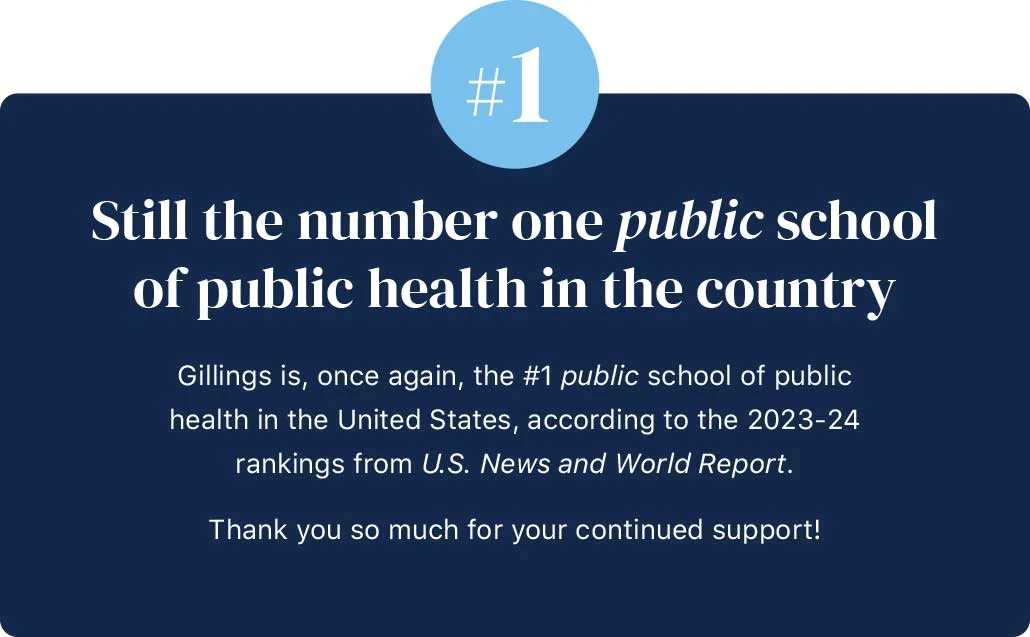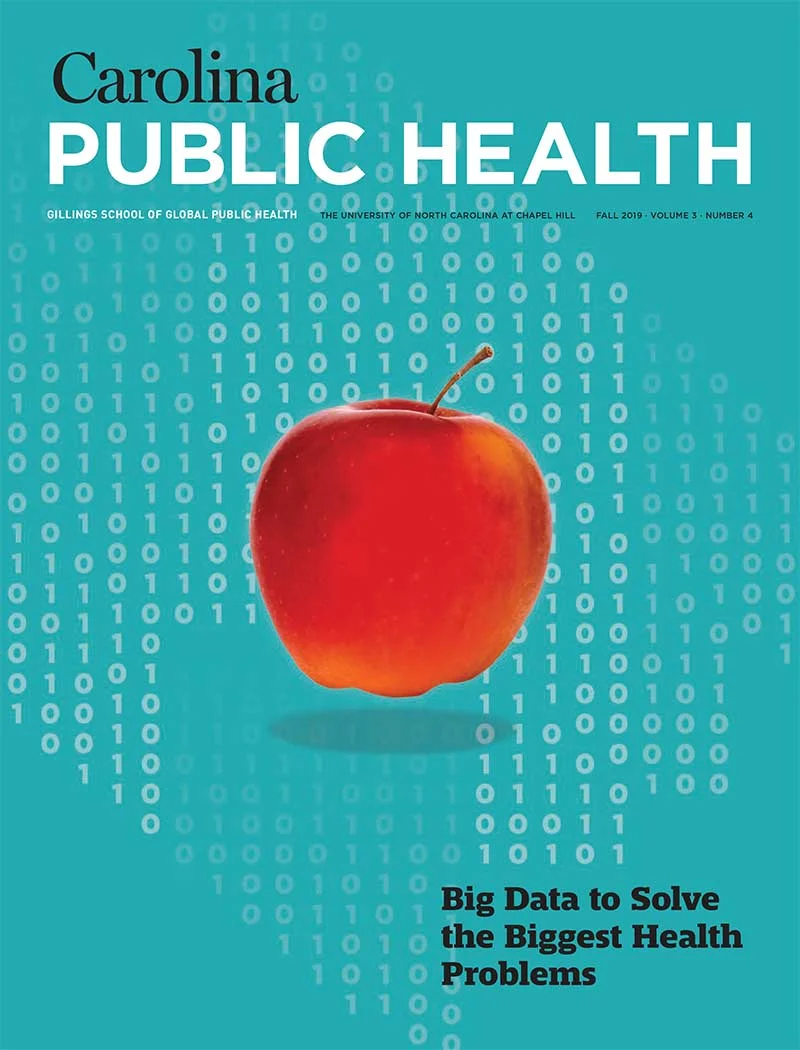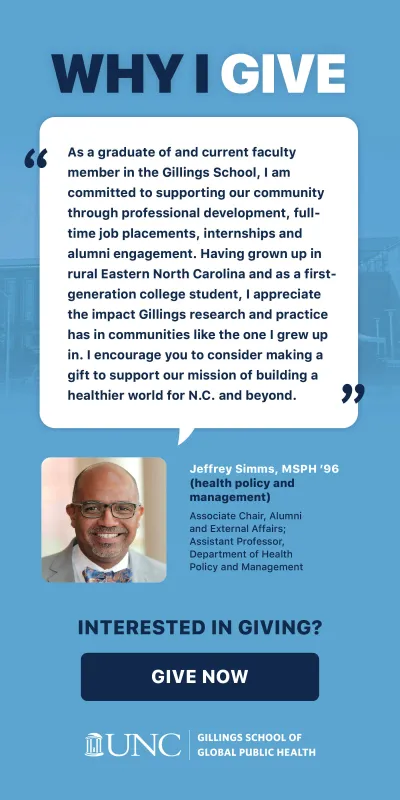Assisting New Mothers in Emergencies
Aunchalee Palmquist researches lactation and breastfeeding in emergencies, aiming to improve support for vulnerable populations and ensure safe nutrition during crises.
Breastfeeding and health equity have been key research interests for Aunchalee Palmquist, PhD, throughout her years of work in anthropology. It was a newspaper story about mothers who were turning to social media groups to find and share breastmilk, rather than buy or sell it, that inspired Palmquist, assistant professor of maternal and child health, to turn her anthropologist lens toward lactation and breastfeeding — an area of research that, until recent years, had received waning attention in her field.
Driving Health Solutions for Under-represented Groups: Too often, the populations who are most burdened by or vulnerable to diseases are underrepresented in research studies and underserved in access to care. We’re Gillings. We’re on it! Equity is a core Gillings value, and our faculty work to find ways to better deploy health-care data and resources to help those who need them most.
“I wanted to get a better handle on why some mothers were struggling to make enough milk for their own babies, but others were pumping enough extra milk to feed two or three,” she says. “I was also curious about how parents dealt with the risks and why they decided to feed their babies this way rather than using formula or pasteurized donor milk from a milk bank.”
Palmquist enrolled in the Mary Rose Tully Training Initiative, the clinical lactation training program at the UNC Gillings School of Global Public Health, to prepare her to do more rigorous research on lactation and breastfeeding. After joining Gillings in 2017, Palmquist established a research agenda on infant feeding in emergencies: Emergencies create enormous challenges for infant nutrition. Palmquist’s training in medical anthropology and clinical lactation prepared her to examine how aid organizations can support recommended nutritional interventions in humanitarian settings, like sharing breastfeeding, sharing breastmilk, and reducing the risks of formula feeding. She collaborated with Dilshad Jaff, MD, MPH, assistant adjunct professor of maternal and child health and formerly, program coordinator for the Gillings School’s Research Innovation and Global Solutions office, on research to improve the quality of perinatal health services for displaced Yazidi families in Iraq.
Their work emphasizes the importance of including mental health support in any kind of health intervention for populations experiencing conflict and other crises. “We are trying to demonstrate that any trauma or mental health issues, especially among women, decreases breastfeeding rates and increases infections in children,” said Jaff, who recently took a new job with the International Committee for the American Red Cross. A native of Iraq who worked as a medical doctor during the Iraq war, Jaff will retain his affiliation with Gillings.
Drawing on the knowledge they gained from their work in Iraq and Jaff’s personal expertise as a physician during conflict, Palmquist and Jaff began working on ways to help vulnerable populations in North Carolina during emergencies.
“How do we help them before, during and after evacuation to protect them from the short- and long-term negative social, economic, and health impacts of natural disasters?”
Aunchalee Palmquist, PhD
Assistant Professor of Maternal and Child Health
“In emergency situations, the needs of people who are pregnant, birthing, or caring for babies are not at the top of the list,” Palmquist says. “We have to figure out how to provide more support to these people, who are at the greatest risk of neglect in emergencies. How do we help them before, during and after evacuation to protect them from the short- and long-term negative social, economic, and health impacts of natural disasters?”
After Hurricane Florence last year, Palmquist and others from the Carolina Global Breastfeeding Institute (CGBI) developed a resource kit for providers and patients in the hospitals the CGBI works with in North and South Carolina. It includes guides for health workers, frontline responders, shelter managers, and volunteers to help families with infants and young children (birth to age 2) in providing safe nutrition during emergencies.
In talking with providers and emergency response personnel across the state, Palmquist also stresses the importance of preparedness, which can provide a critical safety net for infants who are vulnerable to illness and food insecurity in emergency situations.
That means planning ahead and thinking through what families need to feed their babies when there isn’t power or clean water, and when stores are closed. “Most parents may not have thought about how they might prepare formula with no access to clean water or a way to wash bottles,” she says. “We have environmental disruptions year-round — flooding, snowstorms, hurricanes, power outages. It is so important to be prepared, particularly for families with young infants.”
Data and technology could help connect families with information about emergency readiness
and response, Palmquist says. Apps and mobile technology have great potential to use SMS messaging, real-time counseling, and other tools to link people with available resources and support — especially in cases where people are displaced by an emergency event.
Longer term, Palmquist’s goals include building capacity from within historically marginalized communities in North Carolina to improve emergency response in ways that better meet the needs of maternal, child, and family health.
“North Carolina can set the precedent nationally for what good practice looks like,” she says.




